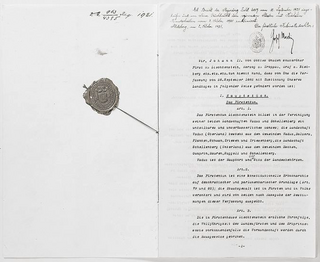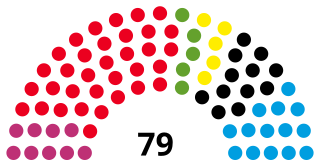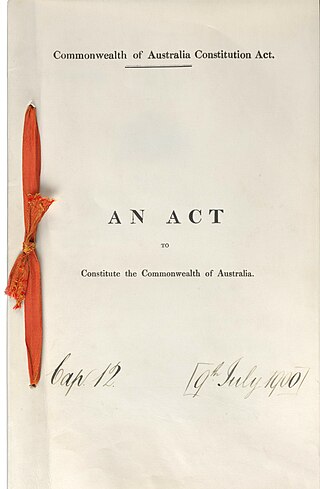
The Basic Law for the Federal Republic of Germany is the constitution of the Federal Republic of Germany.

The Federal Republic of Germany, as a federal state, consists of sixteen states. Berlin, Hamburg and Bremen are called Stadtstaaten ("city-states"), while the other thirteen states are called Flächenländer and include Bavaria, Saxony, and Thuringia, which describe themselves as Freistaaten.
A constitutional amendment is a modification of the constitution of a polity, organization or other type of entity. Amendments are often interwoven into the relevant sections of an existing constitution, directly altering the text. Conversely, they can be appended to the constitution as supplemental additions, thus changing the frame of government without altering the existing text of the document.

The Constitution of the German Reich, usually known as the Weimar Constitution, was the constitution that governed Germany during the Weimar Republic era (1919–1933). The constitution declared Germany to be a democratic parliamentary republic with a legislature elected under proportional representation. Universal suffrage was established, with a minimum voting age of 20. The constitution technically remained in effect throughout the Nazi era from 1933 to 1945 as well as during the Allied occupation of Germany from 1945 to 1949, though practically it had been repealed by the Enabling Act of 1933 and thus its various provisions and protections went unenforced for the duration of Nazi rule, and after World War II, the power of the Allied Control Council and four occupying powers once again stood above the provisions of the constitution.

The Constitution of the Czech Republic is the supreme law of the Czech Republic. The current constitution was adopted by the Czech National Council on 16 December 1992. It entered into force on 1 January 1993, replacing the 1960 Constitution of Czechoslovakia and the constitutional act No. 143/1968 Col., when Czechoslovakia gave way to the Slovak Republic and the Czech Republic in a peaceful dissolution.
An entrenched clause or entrenchment clause of a constitution is a provision that makes certain amendments either more difficult or impossible to pass. Overriding an entrenched clause may require a supermajority, a referendum, or the consent of the minority party. The term eternity clause is used in a similar manner in the constitutions of Brazil, the Czech Republic, Germany, Greece, India, Iran, Italy, Morocco, Norway, and Turkey, but specifically applies to an entrenched clause that can never be overridden. However, if a constitution provides for a mechanism of its own abolition or replacement, like the German Basic Law does in Article 146, this by necessity provides a "back door" for getting rid of the "eternity clause", too.

The Constitution of the Republic of Singapore is the supreme law of Singapore. A written constitution, the text which took effect on 9 August 1965 is derived from the Constitution of the State of Singapore 1963, provisions of the Federal Constitution of Malaysia made applicable to Singapore by the Republic of Singapore Independence Act 1965, and the Republic of Singapore Independence Act itself. The text of the Constitution is one of the legally binding sources of constitutional law in Singapore, the others being judicial interpretations of the Constitution, and certain other statutes. Non-binding sources are influences on constitutional law such as soft law, constitutional conventions, and public international law.

The Constitution of the Principality of Liechtenstein was promulgated on 5 October 1921, replacing the 1862 constitution.

The Constitution of Belgium dates back to 1831. Since then Belgium has been a parliamentary monarchy that applies the principles of ministerial responsibility for the government policy and the Trias Politica.

The Constitution of Latvia is the fundamental law of the Republic of Latvia. Satversme is the oldest Eastern or Central European constitution still in force and the sixth oldest still-functioning republican basic law in the world. It was adopted, as it states itself in the text, by the people of Latvia, as represented in the Constitutional Assembly of Latvia, on 15 February 1922 and came into force on 7 November 1922. It was heavily influenced by Germany's Weimar Constitution and the Swiss Federal Constitution. The constitution establishes the main bodies of government ; it consists of 116 articles arranged in eight chapters.

The Constitution of Cameroon is the supreme law of the Republic of Cameroon. Adopted in 1972, it is Cameroon's third constitution. The document consists of a preamble and 13 Parts, each divided into Articles. The Constitution outlines the rights guaranteed to Cameroonian citizens, the symbols and official institutions of the country, the structure and functions of government, the procedure by which the Constitution may be amended, and the process by which the provisions of the Constitution are to be implemented.

The Landtag of Mecklenburg-Vorpommern is the people's representative body or the state parliament of the German federal state of Mecklenburg-Vorpommern.

The Constitution of Australia is the fundamental law that governs the political structure of Australia. It is a written constitution, that establishes the country as a federation under a constitutional monarchy governed with a parliamentary system. Its eight chapters sets down the structure and powers of the three constituent parts of the federal level of government: the Parliament, the Executive Government and the Judicature.
The Constitution of the Free and Hanseatic city of Hamburg is the basic governing document of the German city-state of Hamburg. It was approved on 6 June 1952. It is the fourth constitution that the state has had, consists of 76 articles, and has been amended 34 times.
The Constitution of North Rhine-Westphalia is the constitutional document that governs the responsibilities and rights of various offices and the Landtag of North Rhine-Westphalia, in Germany.
The State Constitution of the Free Hanseatic City of Bremen is the constitution of the state of Bremen. It dates from October 21, 1947, and was last revised on August 15, 2019, with effect from August 16, 2019.

The Constitution of the State of Baden-Württemberg was passed by the state constitutional assembly on 11 November 1953 after the founding of the state of Baden-Württemberg on 25 April 1952 and came into force on 19 November 1953 with a solemn state ceremony in the main house of the Württemberg State Theatre. Unlike other German state constitutions, it was not confirmed by a referendum. It replaced the constitutions of the states of Baden, Württemberg-Baden and Württemberg-Hohenzollern. For a transitional period from 15 May 1952, the law on the provisional exercise of state power in the southwest German state, which had been passed by the state constitutional assembly, applied.

The Constitution of the State of Schleswig-Holstein of December 13, 1949 came into force on January 12, 1950, under the title State Statute for Schleswig-Holstein. A constitutional and parliamentary reform also led to a change in title on June 13, 1990. The current publication of the constitution of the state of Schleswig-Holstein dates from December 2, 2014.

The Constitution of the Free State of Saxony was issued on 27 May 1992. It came into force on 6 June 1992. The Saxon State Parliament, as the constitutional state assembly, passed it on 26 May 1992 with a majority of 132 votes to 15, with 4 abstentions. beschlossen. Sie wurde bisher nur einmal geändert, um eine Schuldenbremse einzufügen.
The Constitution of the Free State of Thuringia is the state constitution of Thuringia; it is valid in this federal state together with the Basic Law of the Federal Republic of Germany.

















